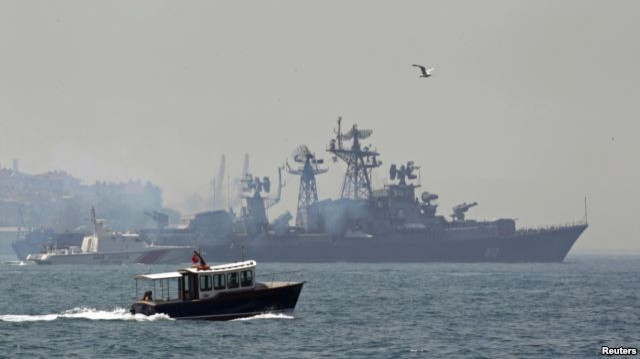Is The Russian Navy Really Going To Syria - And Why?

Depending on who you ask, Russia's naval base in Tartus, Syria, is either a strategically meaningless throwback to the Soviet glory days -- or an essential part of its national security.
On Tuesday, Russia's Interfax news service reported, citing anonymous sources within the country's Defense Ministry, that Russian warships had left ports across Europe to head to the Eastern Mediterranean, some destined for Syria. Eleven ships, including five large amphibious transports -- four capable of carrying 200 soldiers and ten tanks each, one capable of carrying twice as many -- would sail from various locations in the Arctic, Black, and Baltic Seas to participate in exercises in the Atlantic and Mediterranean.
Interfax says that some of those ships are expected to eventually dock at the port of Tartus in Syria offloading food, water, and fuel and taking on new supplies.
Interfax claims a military diplomatic source said that landing ships and destroyers would be making a port call in Tartus. The Russian news agency mentions that one destroyer, the Smetlivy, from the Black Sea, would reach Tartus within just three days. Two large transports, Nikolai Filchenkov and Tsezar Kunikov (the latter of which participated in the war with Georgia in 2008), are also expected from the Black Sea, though it is yet unknown whether they too would dock in Syria.
RIA Novosti says that the Admiral Chabanenko, an advanced destroyer, and three landing craft -- the Alexander Otrakovsky, Georgy Pobedonosets and Kondopoga -- would be leaving from the Arctic Fleet base in Murmansk. Interfax states that all four ships are expected to dock in Tartus, though it is unknown whether they are carrying a large contingent of marines, or whether those marines would even remain in Syria.
The exact nature of the visits is creating concern in the West, especially amid Russia's continued support for Syrian President Bashar Al-Assad in the ongoing conflict and insurgency ripping apart the Middle Eastern country.
Analysts have already questioned Interfax and other agencies' reporting in June on Russian ships destined for Tartus as hype and unreliable reporting.
This time around, Russia may simply be carrying out prescheduled military exercises. But experts reject the idea that maneuvers at such a sensitive diplomatic stage carry no additional meaning to emphasize Russian interests.
Defense analysts speculate that Russia is moving forces into the area to demonstrate its opposition to foreign military intervention in the country.
Moscow has long been an arms provider for Damascus, and many of the former's technicians and engineers remain stationed in the country, training Syrian personnel and servicing weapons. Russia may now intend to evacuate or provide safety for personnel in Tartus. The port is also Russia's sole remaining overseas port outside of the former Soviet Union, and the military may seek to protect access to it in light of the current chaos occurring in Syria.
Between late 2011 and early 2012, the Russian navy's flagship, the aircraft carrier Admiral Kuznetsov, maneuvered off the cost of Syria.
The U.S. State Department said on Tuesday that it hopes the Russian visit to Syria would be limited to refueling purposes alone. The Pentagon said that we have no indication that the purposes for these sailings are anything other than what the Russians have said they're for ... exercises.
If the Russian contingent is moving to Tartus to protect the country's claim on the port, it may be an indication that it intends to keep its privileged access open, regardless of who is in power in Damascus.
At the end of June, Vice-Admiral Viktor Chirkov, the commander of the Russian navy, told RIA Novosti that Tartus is essential to us; it has been operating and will continue to operate.
But others claim the value of Tartus, with its three piers, fuelling station, store houses, limited barracs, and an attached spa and resort, is limited militarily; the base is really more of a psychologically important deadweight from a bygone era.
Ruslan Aliev at the Centre for Analysis of Strategies and Technologies in Moscow said that Tartus is not a real naval base to the BBC in late June.
Aliev says that what is driving Russia's relationship and backing for Syria has little to do with the port or even arms sales. It is instead interested in reclaim the influence it had back in Cold War.
The diplomatic and military influences available to Moscow today is much weaker than decades ago, but if the attention given to its position on Syria conflict is any indication, it plays an undeniably central role to ending or perpetuating the crisis. The deployment of Russian forces to Tartus could serious impede or complicate any plans by NATO to forcibly intervene in the country, though Russia may still be wary of the diplomatic backlash it would receive from such an action.
Even as Russian ships were leaving ports on Tuesday, opposition politicians from Syria were in Moscow to push for the latter's allowance of regime change in Damascus. Russia has so far remained opposed to the removal of Assad from power either by Western or opposition military or political pressure.
© Copyright IBTimes 2024. All rights reserved.




















